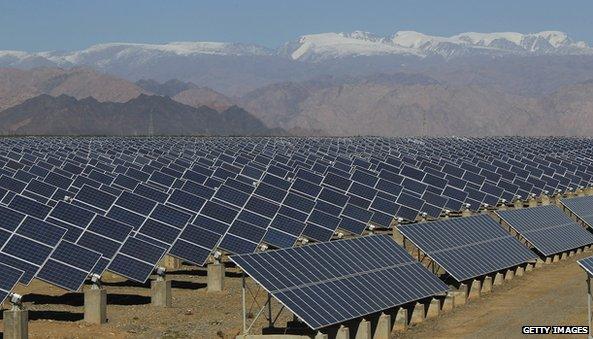Chaori Solar default is a test case for China's markets
- Published
- comments

The default of Chaori Solar could send tremors through not just China but global markets as well
Not big news for most countries, but China has had the first ever default of a corporate bond today.
Chaori Solar, a solar equipment maker, can't afford to pay 89.9 million RMB ($14.7m) in interest due on an one billion RMB bond issued in March 2012. It's the first default of publicly traded debt in China since the government started regulating in 1999. Although small, it could send tremors through not just China but global markets.
The company said this on Tuesday and issued a warning last summer so there are no surprises.
Normally when a company warns that it can't afford a payment, it's viewed as a worrying development. For China, though, attitudes are sanguine as this is viewed as a test case for how the government will deal with what should be a normal procedure.
That's because in China, it's not what normally happens. But as the country develops its financial sector, defaults and bankruptcies are part of the usual course of how markets operate.
Test for new market
For China, which didn't have much of a corporate bond market until recently, this is new. But, the market in corporate debt has grown quickly in the past decade, reaching an estimated $12 trillion by the end of last year.
Previously, where there have been threatened defaults such as in January when a "shadow bank" institution was bailed out to prevent a default on a trust or the rolling over of bank debt, the government has acted due to worries over what defaults could trigger.
But, as Chaori Solar is a corporate bond issued by a struggling company and not a product of the shadow banking system like a trust, some observers would like to see market forces work.
Otherwise, it's hard to see how financial markets can expand and deepen as the government cannot feasibly stand behind all capital markets unlike what it has done so far in the banking system.
This would make a test case since the Chinese government does want to expand non-bank financial markets to take some pressure off of the state-dominated banking system. What they fear is that if default becomes possible, then confidence may drain from the system. This is why shadow banks have been quietly bailed out (see my prior blog).
It's one reason why the Premier Li Keqiang said in his speech to the national legislature that a deposit insurance system will be set up. Right now, the banking system is premised on the government always being on hand to bail it out. But as the financial sector expands, and it already exceeds annual output, it'll become recognisably less feasible.
The challenge for financial reform is that the sequence of policies matters. Allowing default may well help develop the market, but the questions that it could raise about the rest of the financial system, namely the banks and shadow banks, may be a step that the Chinese government would rather not tread. A junk-rated bond could have wider repercussions beyond China.